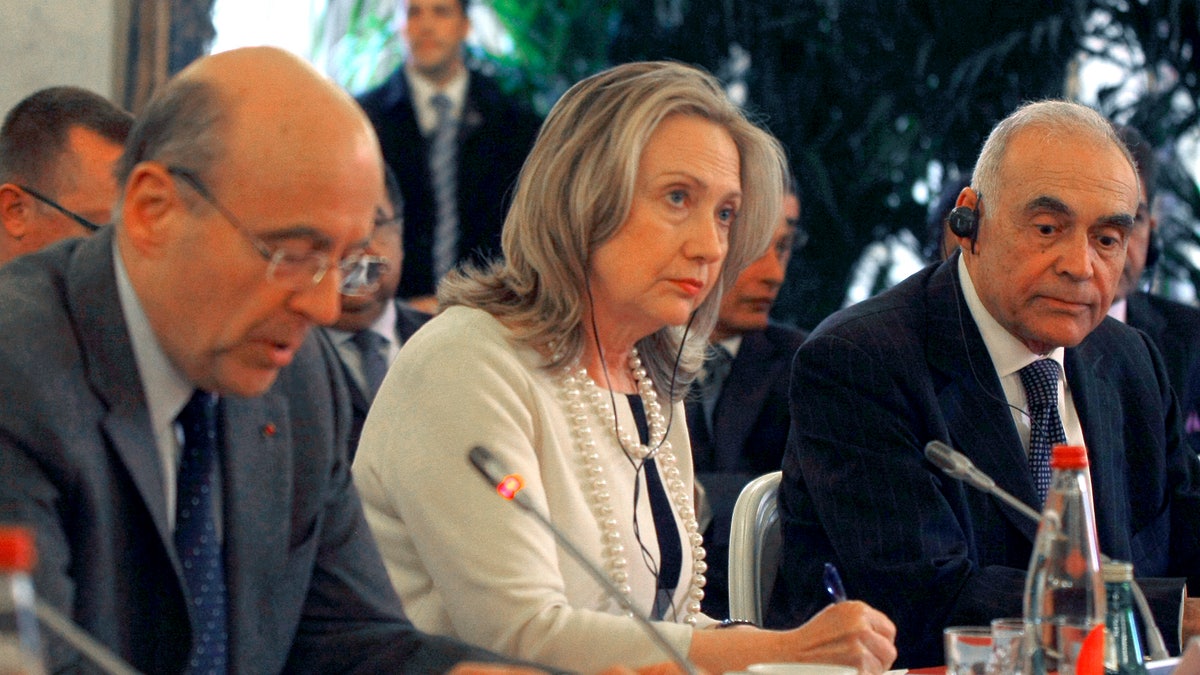
April 19: From left, France's foreign minister Alain Juppe, U.S Foreign Secretary Hillary Rodham Clinton, and Egyptian counterpart, Mohamed Kamel Amr, right, prior to the meeting with a delegation in Pari. (AP)
PARIS – U.S. Secretary of State Hillary Rodham Clinton called Thursday for the U.N. Security Council to adopt a global arms embargo and other tough measures against Syria to reinforce existing Western embargoes if the country fails to abide by a cease-fire designed to end 13 months of bloodshed.
Clinton stopped short of calling for outside military intervention in Syria -- something there is little to no foreign appetite for -- but said it was time to impose more consequential measures on Syrian President Bashar Assad's regime.
"We have to keep Assad off balance by leaving options on the table," she told a Paris meeting of top Western and Arab diplomats from the so-called "Friends of Syria" group.
Clinton's address made clear the U.S. has little faith in the success of special envoy Kofi Annan's peace plan. But although U.S. policy has amounted to an acknowledgment that Assad is unlikely to be dislodged, the U.N. resolution Clinton seeks could strengthen Syrian rebels fighting the Syrian strongman.
Any attempt to push for U.N. sanctions on Syria could meet resistance from Russia and China, which hold vetoes on the U.N. Security Council. Moscow and Beijing have already twice shielded Syria from U.N. sanctions over its yearlong, deadly crackdown on a popular uprising.
Clinton said she'd laid out the case for U.N. Security Council resolve earlier Thursday to Russian Foreign Minister Sergey Lavrov, whom she said "has recognized that we are not in a static situation but a deteriorating one."
At the Paris meeting of 16 top diplomats, French Foreign Minister Alain Juppe said the Friends of Syria group believes Annan's plan is the "last chance" for Syria to avoid civil war. Over the past 13 months, the Syrian government's crackdown is said to have killed more than 9,000 people.
Earlier Thursday, U.N. Secretary-General Ban Ki-moon said Syria was not honoring the Annan cease-fire, which took effect last week, and that violence was escalating. Syrian activists said regime forces took control of a southern town and shot at activists in another soon after international observers left.
Ban recommended that the Security Council quickly approve a 300-strong U.N. observer mission to Syria, a number larger than what was originally envisioned. But he said will review ground developments before deciding when to deploy the mission.
Ban said the mission's success depends on Syria's full cooperation, and he demanded that Assad's government ensure that the observers have unrestricted freedom of movement, unfettered access to the Syrian people, and the use of helicopters and fixed-wing aircraft for their mobility.
He said the U.N. and Syria signed "a preliminary protocol" in Damascus on Thursday but are still discussing the use of aircraft the nationalities of the observers. Ban said Syria's U.N. ambassador Bashar Ja'afari had assured him "there will be full support, including air mobility."
Band called the situation in Syria "highly precarious," and said attacks are on the rise including "shelling of civilian areas, grave abuses by government forces and attacks by armed groups."
U.S. Ambassador Susan Rice, the current Security Council president, said council members would have to send Ban's recommendation for the expanded observer mission back to their capitals. Russia's U.N. Ambassador Vitaly Churkin said Moscow supports the expanded mission.
France and the United States and others have repeatedly called for Assad to step aside. But the Obama administration's policy now reflects a consensus that Assad -- with support from the military -- has a strong hold on power and only an outside military strike could quickly oust him.
The evolving U.S. position comes amid signs that rebel forces are poorly armed and disorganized, efforts to pay them by Arab Gulf states are failing, and sectarian divisions loom in Syria.
Only a small number of international observers are currently in Syria. On Thursday, the observers visited the southern province of Daraa, where activists said anti-regime protesters gathered around them in the village of Khirbet Ghazaleh. The state-run news agency confirmed the observers went to Daraa.
An amateur video posted online by activists showed at least two of the observers, including the team's head Col. Ahmed Himiche, standing outside a U.N. vehicle as dozens of people chanted "death is better than humiliation" and "the people want to topple the regime."
Troops also stormed and took control of the southern town of Busra al-Harir, which regime forces have been attacking for about a month, the Local Coordination Committees activist group said.
Adel al-Omari, an activist based near Busra al-Harir, said the whole town fell in the hand of regime forces Wednesday night after army defectors withdrew from the area.
"Forty percent of Busra al-Harir's homes are destroyed because of the shelling," he said, adding that regime forces are detaining many in the town. "There is a lack of medical products, and regime forces have taken over makeshift hospitals."
Al-Omari said that as observers were visiting the village of Hirak, hundreds of protesters chanted for the downfall of Assad's regime. "Once the observers left, security forces started shooting to disperse the demonstration," al-Omari said, adding that at least three protesters were wounded.
The Local Coordination Committees said troops opened fire in the Mahata area in the southern city of Daraa, apparently to impose a curfew. It said at least 10 civilians were wounded in the shooting.
